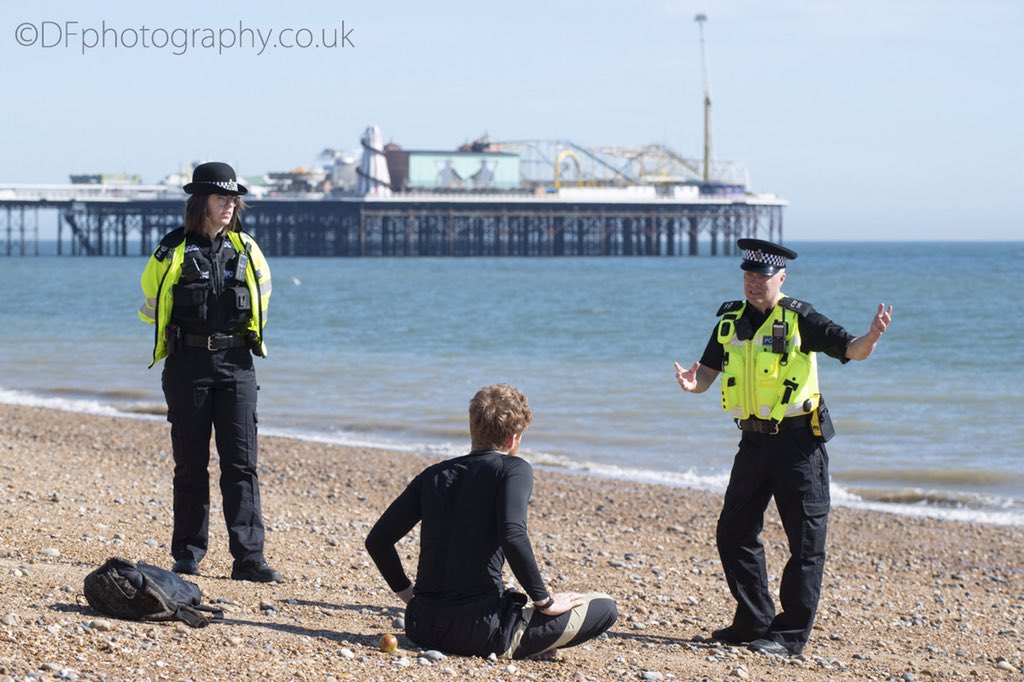Black people were much more likely to be fined by Sussex Police for breaking the coronavirus lockdown rules than white people.
The disparity was one of the widest in the country, according to figures from the Government Statistical Service published today (Monday 27 July).
The figures showed that the force issued fines at a rate that was more than 13 times higher black for people than white people for breaking the covid-19 restrictions.
Sussex Police said that the difference was partly explained by the higher number of fixed penalty notices handed to visitors, with many heading from London to Brighton beach.
In the “visitors” category, the rate of fines per 10,000 black people was 36. This was more than 17 times higher than the rate of 2.1 fines per 10,000 white people.
Even among Sussex residents, the rate of fines handed to black people was nine times higher – at 18 per 10,000 – than the rate for white people.
Sussex Police said that it was unable to account fully for the racial disparities in the number of fines issued to people for breaking the coronavirus lockdown rules.
And the National Police Chiefs’ Council said that black people, men and under 35s were much more likely to be handed a fine by Sussex Police.
Population estimates suggest that just over 100,000 people – or 6 per cent of the population of Sussex – are classed as BAME (black, Asian or minority ethnic). Fewer than 20,000 – or about 1 per cent – are estimated to be black.
Sussex Police said: “It does show disparity across gender, age and ethnicity that cannot be fully accounted for – and we are particularly conscious of, and sensitive to, the concerns around racism or bias in policing globally.
“We have shared and discussed this information with our independent race advisory group and will further scrutinise this data with them, and other independent community representatives, with a commitment to take action around any learning and ensuring our local communities can be confident that our policing approach is fair.”
The figures showed that Sussex Police dished out the sixth highest number of fixed penalties in England and Wales from Friday 27 March to Saturday 25 May. And only three forces handed more fines to visitors from outside their area.

In all, Sussex Police gave out 848 fixed penalty notices to people breaking the coronavirus lockdown.
Of those, 466 (55 per cent) went to people from outside Sussex, with 128 of those going to people listed as BAME.
The other 382 fines were handed to people from Sussex, with 59 of those going to people listed as BAME.
Sussex Police handed out the fifth highest number of coronavirus fines to people listed as BAME and the third highest number to black people.
The force said: “In line with national guidance, fines were issued as a last resort and only after officers and PSCOs (police community support officers) had engaged, explained and encouraged members of the public to comply with the health regulations.
“Sussex was one of a number of forces which saw a relatively high number of non-residents issued with fines, people who had travelled from London, to visit the county’s coastal and beauty spots.”

Temporary Deputy Chief Constable Julia Chapman said: “In Sussex we have always taken pride in our strong, community-based relationships, working hard to gain the trust and confidence of the public.
“Throughout this pandemic, and in line with national guidance, our officers and PCSOs worked to encourage people to comply with the new health regulations and used enforcement only as a last resort.
“The data shows that the vast majority of fines issued in Sussex, although relatively low overall, were during the peak of the lockdown period when people travelling into the county, many from urban areas, would have been fully aware that it was prohibited.
“The report also notes that those forces with rural and coastal areas, like Sussex, tended to issue higher proportions of fines to non-residents and this is relevant when assessing disparity rates since we know that the BAME population tend to be disproportionately concentrated in metropolitan areas.
“Nevertheless, it does show disparity across gender, age and ethnicity that cannot be fully accounted for – and we are particularly conscious of, and sensitive to, the concerns around racism or bias in policing globally.
“We have shared and discussed this information with our independent race advisory group and will further scrutinise this data with them, and other independent community representatives, with a commitment to take action around any learning and ensuring our local communities can be confident that our policing approach is fair.”







